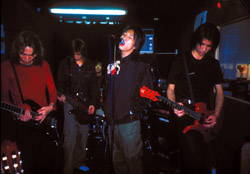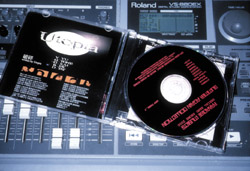 Online
Edition
Online
Edition | From
the editor Letters to the editor Milestone Answerman Campus Life Periscope Social Issues People Photo Features Education Channel Culture & Leisure Science |
| Last
Issue Archive |
| About
Varsity Advertise Media Links CUHK homepage JLM homepage |
Related
Links
FM
Select Radio 104
![]()
Indie bands strive
for music diversity
By Jess Kong
Indie
bands, or “independent” bands, are attracting more and more attention
in Hong Kong.
Instead
of making music for the market, indie bands stick to their own musical
styles.
Harry
Wong, a disk jockey at FM Select Radio 104, described indie bands as free
and boundless.
Said
Maggie Chan, an indie band fan: “I love indie bands because their music
is so different from what I watch on TV.
“To
me, each indie band is unique. They have their own styles,” said Ms.
Chan.
“As
a fan, I would like indie bands to release more CDs,” said Ms. Chan.
“But they had better use their own money than seek sponsorship from big
record companies because those companies may restrict their styles.”
One
local indie band, Utopia, was formed one and a half years ago.
Utopia
has five members, aged 24 to 26. Tune and Sai are the guitar players; Wah
is the bass guitar player; Tat is the drummer; and Yu is the vocalist.
According
to FM Select’s Mr. Wong, it is not appropriate to view indie bands as
representing a kind of musical style.
Tune
explained, “Names of certain music styles like ‘jazz’, ‘hip-hop’
and ‘rock’ are used only by the media. Musicians do not classify their
music.”
Said
Sai: “Utopia plays music with a rock style, but it also contains a pop
element.
“What
we have are creativity and sincerity,” said he.
“Indie
bands are so innovative that they stimulate Hong Kong music. We should
give them more freedom and allow mistakes,” said Mr. Wong.
Money
is important to indie bands.
They
need equipment and a venue to play. Guitars, bass, drum sets and
amplifiers cost about $20,000. Room rent is about
$200 per hour.
Said
Yu: “The lack of money is the main obstacle to an indie band.”
Said
Sai: “To us, it is a paradox because spending more time on music means
having less time on work. So there is never enough money for us to play
better music.”
Utopia
would accept support from a record company only on the condition that the
company allowed the band to have its own style.
Mr.
Wong said, “If indie bands
are only to meet market demands, they will lose their values even if they
become famous.”
Said
Tune: “However, we have to consider the finances.
“The
production of a single CD containing just four or five songs already costs
$30,000, not to mention promotion costs.”
Forming
a band is difficult because it is hard to find people who have similar
attitudes towards music. It is even more difficult to maintain their
relations and style.
“It
is difficult to find a time when five of us are all available,” said Sai.
Live
shows are the most exciting events for indie bands.
Utopia
has live performances every two or three months, usually at schools.
According
to Wah, more and more youngsters love their band’s sound.
Said
Tune: “People as young as 14 or 15 play band music, but those around 18
to 20 are most actively involved in band music.”
As
a result, more and more new bands are formed and promotion has become
important for an indie band to stand out.
Lazy
Mother Fucker is an indie band that has successfully stood out and become
popular.
LMF
is well known for its use of foul language in lyrics, an act that has
aroused much attention in the media.
According
to Mr. Wong, many factors must work together to make an indie band
outstanding and popular.
Said
he: “First, there must be people who admire and support the band and its
music.”
Second
are channels of promotion.
“For
example, LMF has some members who are already well-known. This helps
promotion a lot,” said Mr. Wong.
Media
coverage is also important for popularity,
according to Mr. Wong.
“Programmes
that broadcast band music like those on Commercial Radio 2 let more people
know about the bands,” said Mr. Wong.
Commercial
Radio 2 also helped several indie bands to release compilation CDs.
Utopia
released a compilation CD featuring other bands and
one of their own shows.
New technologies such as the Internet help indie bands promote their music.
“In the past, we had to put up posters on Nathan Road and music centres.”
“But
now, posting online advertisements is more convenient and effective,”
said Tune.
The
indie bands also have some fans like Ms. Chan, who writes homepages for
them.
Tune
said they could thus concentrate on playing music because promotion is no
longer their job.
Both
Mr. Wong and Utopia are optimistic about the survival of indie bands.
Mr.
Wong said, “An indie band has its own style and niche in the local music
industry.
“It
may have a bright future though it may not become the mainstream of Hong
Kong music.”
Said
Tat: “We hope that more people will listen to band music and truely
admire indie bands.
“We
also hope that both the audience and record companies will become more
open-minded and the whole industry will become more united.”
Yu
would like to see a crackdown on pirated CDs in the market.
“Pirated
CDs affect the profits of record companies, reducing the willingness of
the companies to explore the indie band market.
“So,
the development of indie bands is being hindered,” said Yu.
![]()
|
Jess
Kong
 Indie band Utopia rehearsing in their studio. |
‘Indie bands are so innovative that they stimulate Hong
Kong music.’
|
Jess
Kong
 Some indie band CDs are compilations featuring various artists. |